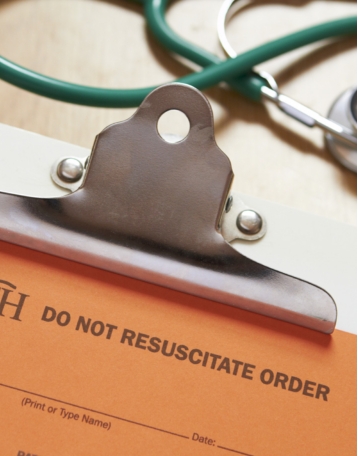Medical EMERGENCIES

a game plan for the unexpected
It’s 2 a.m., and the phone rings. You get the call that one of your aging parents has been taken to the ER. Are you prepared?
Older adults are fearful of losing their independence and do not want to become dependent on their children or loved ones. And, they may not ask for help because it is seen as a sign of weakness or their inability
to care for themselves. But, by assisting them to make some decisions
today, they can be assured that they will be able to live how and where
they choose, even when they are no longer able to speak or make
decisions for themselves.
Compiling a comprehensive document containing health information is the first step in preparing for unforeseen medical emergencies. This document should include general information such as emergency contacts, health-insurance information, health conditions, past surgeries and illnesses as well as a medication list. Preferred Care at Home offers an on-line version free of charge called Personal Health Record, which can be downloaded by going to www. preferhome.com/NWLA. This document is a health-history tool, an educational manual and a care playbook wrapped into one.
Completing advance directives is the next step in preparing for an emergency phone call. Advance directives are legal documents that allow people to choose how they want to live once they are no longer able to make decisions or speak for themselves. There are three basic types of advanced directives in Louisiana: Declaration (for life-sustaining measures, or “living will”), a DNR (Do Not Resuscitate), and Power of Attorney for Health Care. Often a “living will” will also include a DNR directive.
In Louisiana, a Declaration or Power of Attorney for Health Care may be written without the assistance of an attorney. However, two witnesses who are not related by blood or marriage or would not be entitled to any portion of the estate are required. Notarization is not necessary. Just because a living will is signed at a hospital, it may not be valid outside of the property and/or for future events.
A Declaration, or “living will,” is a document in which you choose what type of medical treatment(s) you are to receive when you are no longer able to express your wishes. In this document, you will specify whether or not you want or do not want life-sustaining procedures and under what conditions. This document will only take effect if you are comatose, incompetent or otherwise mentally or physically incapable of communication.
A Power of Attorney for Health Care is different from a Declaration (living will). It is a legal document in which you choose a person or persons to make decisions and advocate about health care for you when you are no longer able to make decisions or speak for yourself. The person or persons you designate as your agent can only make decisions for you when you are incapacitated.
Once prepared, copies of all of these documents need to be placed into a well-marked binder in home as well as with family members and physicians with additional copies ready to go should you receive a 2 a.m. phone call.
Having
a plan for long-term care is the next step in being prepared for what
may lie ahead. Long-term care is the support and assistance needed for
“hands-on” care called Activities of Daily Living (ADLs), which include
assistance with bathing, dressing, toileting, grooming, transferring,
ambulating and eating. However, it is often “hands-off” care called
Instrumental Activities of Daily Living which are the ones usually
needed first. These may include housekeeping, meal preparation and
incidental transportation.
Most realizations that it is time for long-term care follow an incident which often ends up at the emergency room. Depending on the situation following the hospital or rehab stay, loved ones may no longer be able to live by themselves without assistance, either short-term or long-term. Home care and facility care are the two most common types of long-term care. Unfortunately, Medicare will only pay for long-term care if skilled services or rehabilitative care is required. Medicare or other health insurance will not pay for non-skilled assistance with activities of daily living, so planning for how to cover the cost of long-term care should not be overlooked.
Home care provides the option of remaining at home, close to neighbors, surrounded by our precious memories while maintaining a sense of independence. It also allows keeping beloved pets and maintaining a flexible daily schedule.
Facility care provides physical, mental, nutritional and social activities. However, facility care requires moving away from familiar surroundings and conforming to the facility’s time schedule for meals, activities, . Preparing for medical emergencies and the future may be difficult to think about or uncomfortable to discuss. However, making decisions today about the future will provide peace of mind knowing that our loved ones have documented how they choose to live their life … and on their terms.
Scott H. Green is a Certified Senior Advisor® and president of Preferred Care at Home of Northwest Louisiana. Green can be reached via e-mail at scottg@ preferhome.com
